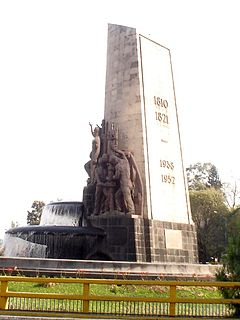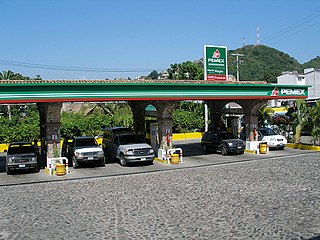
The Anglo-Persian Oil Company (APOC) was a British company founded in 1908 following the discovery of a large oil field in Masjed Soleiman, Iran. The British government purchased 51% of the company in 1914, gaining a controlling number of shares, effectively nationalizing the company. It was the first company to extract petroleum from Iran. In 1935 APOC was renamed the Anglo-Iranian Oil Company (AIOC) when Reza Shah Pahlavi formally asked foreign countries to refer to Persia by its endonym Iran.

Petroleum politics have been an increasingly important aspect of diplomacy since the rise of the petroleum industry in the Middle East in the early 20th century. As competition continues for a vital resource, the strategic calculations of major and minor countries alike place prominent emphasis on the pumping, refining, transport, sale and use of petroleum products. However, international climate policy and unconventional oil and gas developments may change the balance of power between petroleum exporting and importing countries with major negative implications expected for the exporting states.

The Rumaila oil field is a super-giant oil field located in southern Iraq, approximately 20 mi (32 km) from the Kuwaiti border. Discovered in 1953 by the Basrah Petroleum Company (BPC), an associate company of the Iraq Petroleum Company (IPC), the field is estimated to contain 17 billion barrels, which accounts for 12% of Iraq's oil reserves estimated at 143.1 billion barrels. Rumaila is said to be the largest oilfield ever discovered in Iraq and is considered the third largest oil field in the world.

The Iraq Petroleum Company (IPC), known prior to 1929 as the Turkish Petroleum Company (TPC), is an oil company which, between 1925 and 1961, had a virtual monopoly on all oil exploration and production in Iraq. It is jointly owned by some of the world's largest oil companies and headquartered in London, England, although today it is a paper entity with historical rights and plays no part in the modern development of Middle Eastern oil.

The Mexican oil expropriation was the nationalization of all petroleum reserves, facilities, and foreign oil companies in Mexico on March 18, 1938. In accordance with Article 27 of the Constitution of 1917, President Lázaro Cárdenas declared that all mineral and oil reserves found within Mexico belong to "the nation", i.e., the federal government. The Mexican government established a state-owned petroleum company, Petróleos Mexicanos, or PEMEX. For a short period, this measure caused an international boycott of Mexican products in the following years, especially by the United States, the United Kingdom, and the Netherlands, but with the outbreak of World War II and the alliance between Mexico and the Allied powers, the disputes with private companies over compensation were resolved. The anniversary, March 18, is now a Mexican civic holiday.

The Ministry of Petroleum (MOP) (Persian: وزارت نفت Vezârat-e Naft) manages the oil industry, the producer of oil and petrochemical products. MoP is in charge of all issues pertaining to exploration, extraction, exploitation, distribution and exportation of crude oil and oil products. In addition, according to the "Imports and Exports Regulation Act", issuing import licenses for such products is also among the functions of the Ministry of Petroleum. According to BP, Iran's has 137.6 billion barrels (2.188×1010 m3) of proven oil reserves and 29.61 trillion cubic meters of proven gas reserves. Iran ranks third in the world in oil reserves and second in gas reserves. It is responsible for applying the principle of Iranian ownership and sovereignty over oil and gas reserves. Also, it is undertake the separation of sovereignty tasks from management and development of country's oil and gas industry.
The nationalization of oil supplies refers to the process of confiscation of oil production operations and private property, generally in the purpose of obtaining more revenue from oil for oil-producing countries' governments. This process, which should not be confused with restrictions on crude oil exports, represents a significant turning point in the development of oil policy. Nationalization eliminates private business operations—in which private international companies control oil resources within oil-producing countries—and allows oil-producing countries to gain control of private property. Once these countries become the sole owners of these confiscated resources, they have to decide how to maximize the net present value of their known stock of oil in the ground. Several key implications can be observed as a result of oil nationalization. "On the home front, national oil companies are often torn between national expectations that they should 'carry the flag' and their own ambitions for commercial success, which might mean a degree of emancipation from the confines of a national agenda."

Venezuela is one of the world's largest exporters of oil and has the world's largest proven oil reserves at an estimated 296.5 billion barrels as of 2012.

The petroleum industry in Mexico makes Mexico the eleventh largest producer of oil in the world and the thirteenth largest in terms of net exports. Mexico has the seventeenth largest oil reserves in the world, and it is the fourth largest oil producer in the Western Hemisphere behind the United States, Canada and Venezuela. Mexico is not a member of the OPEC or any petroleum production related organizations, but since 1994 it is a member of the North American Free Trade Agreement.

Crescent Petroleum is the first and largest private upstream oil and gas company in the Middle East. Founded in 1971, Crescent Petroleum is headquartered in the Emirate of Sharjah, United Arab Emirates (UAE), with current operations in both the UAE and the Kurdistan Region of Iraq (KRI).

For the economic effects refer to Economy of Iran.

The Bahrain Petroleum Company (BAPCO) is an integrated national oil company of Bahrain.

Iraq was the world's 5th largest oil producer in 2009, and has the world's fifth largest proven petroleum reserves. Just a fraction of Iraq's known fields are in development, and Iraq may be one of the few places left where vast reserves, proven and unknown, have barely been exploited. Iraq's energy sector is heavily based upon oil, with approximately 94 percent of its energy needs met with petroleum. In addition, crude oil export revenues accounted for over two-thirds of GDP in 2009. Iraq's oil sector has suffered over the past several decades from sanctions and wars, and its oil infrastructure is in need of modernization and investment. As of June 30, 2010, the United States had allocated US$2.05 billion to the Iraqi oil and gas sector to begin this modernization, but ended its direct involvement as of the first quarter of 2008. According to reports by various U.S. government agencies, multilateral institutions and other international organizations, long-term Iraq reconstruction costs could reach $100 billion (US) or higher.

The nationalization of the Iranian oil industry resulted from a movement in the Iranian parliament (Majlis) to seize control of Iran's oil industry, which had been run by private companies, largely controlled by foreign interests. The legislation was passed on March 15, 1951, and was verified by the Majlis on March 17, 1951. The legislation led to the nationalization of the Anglo-Persian Oil Company (AIOC). The movement was led by Mohammad Mosaddegh, a member of the Majlis for the National Front and future prime minister of Iran. The movement to nationalize the oil industry was the reaction to the following concessions made by Iran to foreign powers: the Reuter concession of 1872, proceeding letter,D'Arcy Concession?] the 1933 agreement between the Iranian government and AIOC, and the Gas-golshaian[?] contract. According to the political scientist Mark J. Gasiorowski, the oil nationalization movement had two major results: the establishment of a democratic government and the pursuit of Iranian national sovereignty.
The petroleum industry in Syria forms a major part of the economy of Syria. According to the International Monetary Fund, before the Syrian Civil War, oil sales for 2010 were projected to generate $3.2 billion for the Syrian government and accounted for 25.1% of the state's revenue.
According to the United States Energy Information Administration (EIA), Pakistan may have over 9 billion barrels (1.4×109 cubic metres) of petroleum oil and 105 trillion cubic feet (3.0 trillion cubic metres) in natural gas (including shale gas) reserves.












